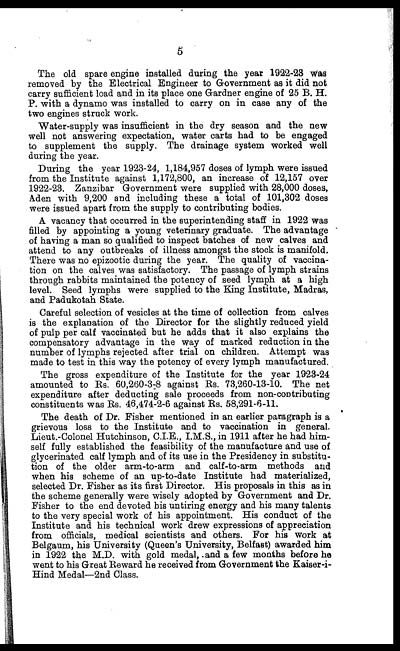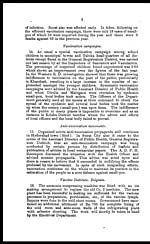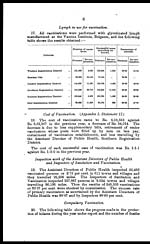Medicine - Vaccination > 1899-1928 - Report on vaccination in the Bombay Presidency > Vaccination in Bombay 1924-1928 > 1923-1924 - Notes on vaccination in the Bombay Presidency for the year 1923-24
(13) Page 5
Download files
Individual page:
Thumbnail gallery: Grid view | List view

5
The old spare engine installed during the year 1922-23 was
removed by the Electrical Engineer to Government as it did not
carry sufficient load and in its place one Gardner engine of 25 B. H.
P. with a dynamo was installed to carry on in case any of the
two engines struck work.
Water-supply was insufficient in the dry season and the new
well not answering expectation, water carts had to be engaged
to supplement the supply. The drainage system worked well
during the year.
During the year 1923-24, 1,184,957 doses of lymph were issued
from the Institute against 1,172,800, an increase of 12,157 over
1922-23. Zanzibar Government were supplied with 28,000 doses,
Aden with 9,200 and including these a total of 101,302 doses
were issued apart from the supply to contributing bodies.
A vacancy that occurred in the superintending staff in 1922 was
filled by appointing a young veterinary graduate. The advantage
of having a man so qualified to inspect batches of new calves and
attend to any outbreaks of illness amongst the stock is manifold.
There was no epizootic during the year. The quality of vaccina-
tion on the calves was satisfactory. The passage of lymph strains
through rabbits maintained the potency of seed lymph at a high
level. Seed lymphs were supplied to the King Institute, Madras,
and Padukotah State.
Careful selection of vesicles at the time of collection from calves
is the explanation of the Director for the slightly reduced yield
of pulp per calf vaccinated but he adds that it also explains the
compensatory advantage in the way of marked reduction in the
number of lymphs rejected after trial on children. Attempt was
made to test in this way the potency of every lymph manufactured.
The gross expenditure of the Institute for the year 1923-24
amounted to Rs. 60,260-3-8 against Rs. 73,260-13-10. The net
expenditure after deducting sale proceeds from non-contributing
constituents was Rs. 46,474-2-6 against Rs. 58,291-6-11.
The death of Dr. Fisher mentioned in an earlier paragraph is a
grievous loss to the Institute and to vaccination in general.
Lieut.-Colonel Hutchinson, C.I.E., I.M.S., in 1911 after he had him-
self fully established the feasibility of the manufacture and use of
glycerinated calf lymph and of its use in the Presidency in substitu-
tion of the older arm-to-arm and calf-to-arm methods and
when his scheme of an up-to-date Institute had materialized,
selected Dr. Fisher as its first Director. His proposals in this as in
the scheme generally were wisely adopted by Government and Dr.
Fisher to the end devoted his untiring energy and his many talents
to the very special work of his appointment. His conduct of the
Institute and his technical work drew expressions of appreciation
from officials, medical scientists and others. For his work at
Belgaum, his University (Queen's University, Belfast) awarded him
in 1922 the M.D. with gold medal, and a few months before he
went to his Great Reward he received from Government the Kaiser-i-
Hind Medal—2nd Class.
Set display mode to: Large image | Zoom image | Transcription
Images and transcriptions on this page, including medium image downloads, may be used under the Creative Commons Attribution 4.0 International Licence unless otherwise stated. ![]()
| Permanent URL | https://digital.nls.uk/91047533 |
|---|
| Attribution and copyright: |
|
|---|




